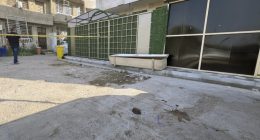The staggering science and jaw-dropping feats of humanity at mission control for Mars make the particle physicist more excited than ever. Will they find signs of life?
‘They’re talking, now,” says Brian Cox (particle physics professor, not Succession tyrant), gesturing to the banks of screens filled with numbers, images, graphs and data, “to the solar system.” Cox is in the Jet Propulsion Laboratory in Pasadena, California – otherwise known as mission control for Mars 2020. Everything we can see is dedicated to ensuring the safe passage of the Perseverance rover across the surface of Mars as it searches for, among other things, signs that we are not alone in the universe.
In Brian Cox: Seven Days on Mars (BBC Two), the professor spends a week with the engineers and scientists dedicated to the multibillion-dollar task of developing the rover, sending it safely on its six-month journey through space and landing it on the hazardous rocky surface. They must then compile its daily set of instructions – thousand of lines of code – and upload them via the Deep Space Network so it can take rock samples, beam back data and make its way to the ancient dried river delta within Jezero Crater, whose hydrated history is thought to make it the most likely site on which to find evidence of past Martian life.




